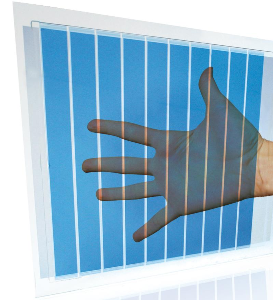Mar 25 2014
Heliatek GmbH, world-leading company in the production of organic solar film, has reached a new record in the efficiency of transparent solar cells. The latest development allows transparency levels up to 40% with an efficiency of over 7%. The company already holds the world record of 12% cell efficiency for opaque (non-transparent) organic solar cells.

This lab development underscores the company's strategy to supply its transparent HeliaFilm™ to glass manufacturers for both building integration (BIPV) and car roofs. "The transparency of our products is at the core of our market approach. Our HeliaFilm™ is customized to meet our partners specific needs," added Thibaud Le Séguillon, Heliatek CEO. "We are a component supplier and this component is a film which can combine transparency and energy generation. This unique combination widens our market potential."
Both these application areas use tinted glass to reduce glare which can be done by applying a film, so changing the film to one that generates electricity as well is a drop-in for manufacturers. Using HeliaFilm™ in glass car roofs will not only generate energy, but will also allow the car manufacturers to claim Eco-innovation credits towards CO2 emission goals. Architectural glass panels and windows incorporating HeliaFilm™ enable electricity to be discretely generated on the outside envelope of a building.
The latest generation of organic solar cells with a 40% light transparency reaches an efficiency record of 7.2%. The measurement follows standard testing conditions using a white background. Heliatek thus succeeded in generating an optimal energy conversion for transparent HeliaFilm™. Currently, its opaque cells achieve 12% efficiency. 7.2% cells mirror the same efficiency, since the partial transparency allows the usage of only 60% of the light for the energy harvesting. Depending on the application, the balance between light let through and electricity generated can be adjusted. The production of transparent HeliaFilm™ is possible with the introduction of transparent conductive layers at the front- and back-side of the solar cells.
The production of HeliaFilm™ is based on small molecules (oligomers). Oligomers are deposited at low temperatures in a roll-to-roll vacuum process. Their selective absorption of the solar spectrum targets different colors and transparency to convert sunlight into electricity.
With this development, Heliatek maintains its technology leadership in the production of organic solar films. This milestone development supports Heliatek and its industry partners for the realization of attractive products for applications in the building material and automotive industry. Heliatek has successfully established technology partners, such as AGC Glass Europe, and is ramping up its production for first reference and pilot projects.
About Heliatek:
Heliatek was spun-off in 2006 from the Technical University of Dresden and the University of Ulm. The company is one of the leaders in the Organic Electronics Energy field through both its development and its manufacturing of organic solar films based on small molecules. Its business model is to supply custom-designed HeliaFilm™ to industries such as building and construction material, automotive, light structure and electronics. Heliatek maintains a total staff of some 75 specialists at its facilities in Dresden and Ulm, Germany. Investors in Heliatek include leading industrial and financial companies such as BASF, Bosch, RWE, Wellington Partners and eCapital. Research and development work, as well as the installation of production technology, has been funded by the Free State of Saxony, the BMBF (Federal Ministry for Education & Research, projects: LOTsE (03EK3505E), Organic pin-devices 2.1 (03IPT602B)), the BMWi (Federal Ministry of Economics and Technology) and the European Union. Heliatek is currently operating its first roll-to-roll manufacturing line installed in Dresden, Germany, which went into production in the fourth quarter of 2012.